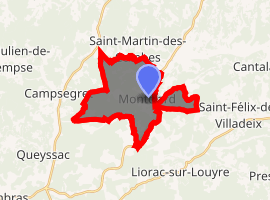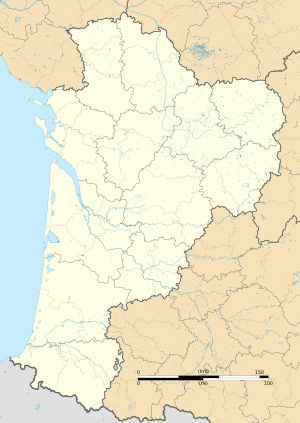Saint-Georges-de-Montclard
Saint-Georges-de-Montclard (Occitan: Sent Jòrgi de Montclar) is a commune in the Dordogne department in Nouvelle-Aquitaine in southwestern France.
Saint-Georges-de-Montclard Sent Jòrgi de Montclar | |
|---|---|
A general view of Saint-Georges-de-Montclard | |
 Coat of arms | |
Location of Saint-Georges-de-Montclard 
| |
 Saint-Georges-de-Montclard  Saint-Georges-de-Montclard | |
| Coordinates: 44°55′59″N 0°37′19″E | |
| Country | France |
| Region | Nouvelle-Aquitaine |
| Department | Dordogne |
| Arrondissement | Périgueux |
| Canton | Périgord Central |
| Intercommunality | Pays de Villamblard |
| Government | |
| • Mayor (2008–2014) | Bernard Guérinel |
| Area 1 | 13.68 km2 (5.28 sq mi) |
| Population (2017-01-01)[1] | 291 |
| • Density | 21/km2 (55/sq mi) |
| Time zone | UTC+01:00 (CET) |
| • Summer (DST) | UTC+02:00 (CEST) |
| INSEE/Postal code | 24414 /24140 |
| Elevation | 62–189 m (203–620 ft) (avg. 99 m or 325 ft) |
| 1 French Land Register data, which excludes lakes, ponds, glaciers > 1 km2 (0.386 sq mi or 247 acres) and river estuaries. | |
Population
| Year | Pop. | ±% |
|---|---|---|
| 1962 | 314 | — |
| 1968 | 273 | −13.1% |
| 1975 | 263 | −3.7% |
| 1982 | 262 | −0.4% |
| 1990 | 258 | −1.5% |
| 1999 | 269 | +4.3% |
| 2008 | 269 | +0.0% |
gollark: ```python#!/bin/env python3chars = [chr(n) for n in range(126)]firstchar = chars[0]lastchar = chars[len(chars) - 1]def increment_char(character): return chr(ord(character) + 1)def old_increment_string(string_to_increment): reversed_string = list(reversed(string_to_increment)) # Reverse the string for easier work. for rindex, char in enumerate(reversed_string): if char == lastchar: # If we can't increment this char further, try the next ones. reversed_string[rindex] = firstchar # Set the current char back to the first one. reversed_string[rindex + 1] = increment_char(reversed_string[rindex + 1]) # Increment the next one along. else: # We only want to increment ONE char, unless we need to "carry". reversed_string[rindex] = increment_char(reversed_string[rindex]) break return ''.join(list(reversed(reversed_string)))def increment_string(to_increment): reversed_string = list(to_increment) # Reverse the string for easier work. for rindex, char in enumerate(reversed_string): if char == lastchar: # If we can't increment this char further, try the next ones. reversed_string[rindex] = firstchar # Set the current char back to the first one. reversed_string[rindex + 1] = increment_char(reversed_string[rindex + 1]) # Increment the next one along. else: # We only want to increment ONE char, unless we need to "carry". reversed_string[rindex] = increment_char(reversed_string[rindex]) break return ''.join(list(reversed_string))def string_generator(): length = 0 while 1: length += 1 string = chars[0] * length while True: try: string = increment_string(string) except IndexError: # Incrementing has gone out of the char array, move onto next length break yield string```
gollark: Except it enumerates all possible ASCII strings instead.
gollark: I made that!
gollark: no.
gollark: Check out my cool project!http://localhost:3030
See also
References
- "Populations légales 2017". INSEE. Retrieved 6 January 2020.
| Wikimedia Commons has media related to Saint-Georges-de-Montclard. |
This article is issued from Wikipedia. The text is licensed under Creative Commons - Attribution - Sharealike. Additional terms may apply for the media files.